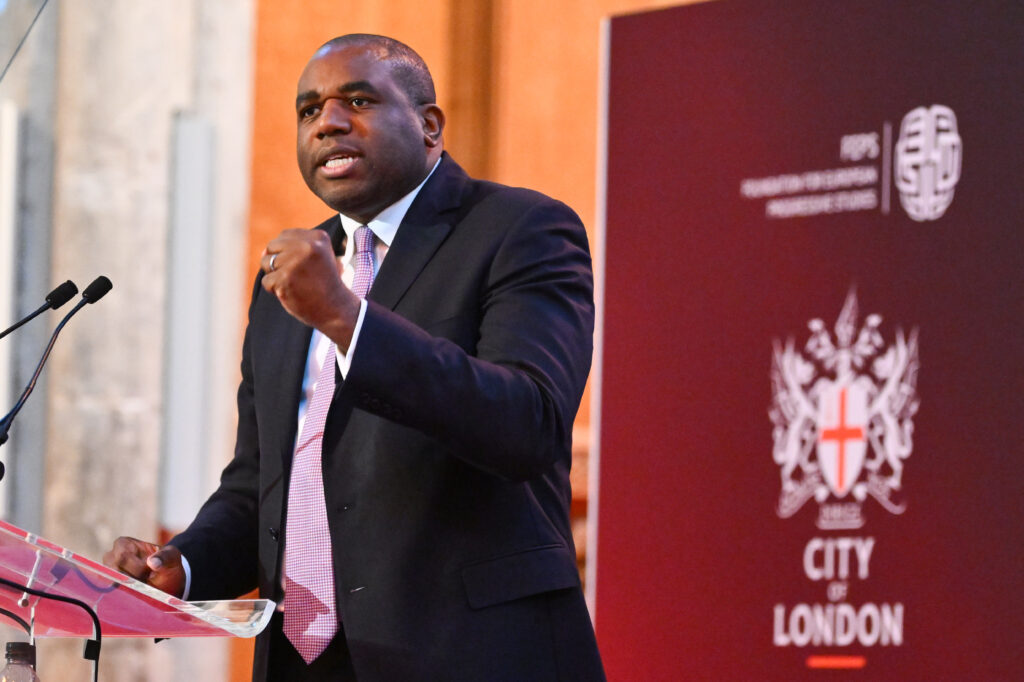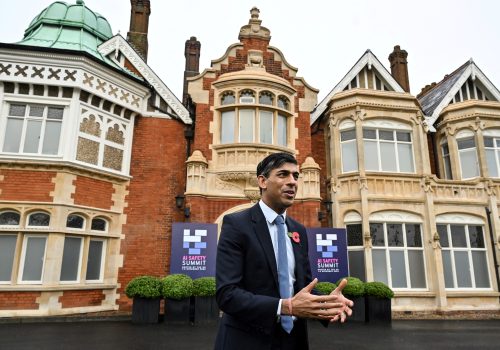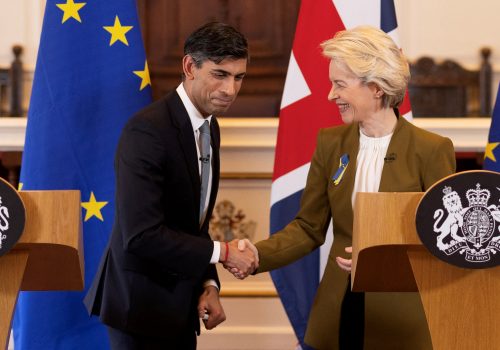“A week is a long time in politics,” observed Harold Wilson, British prime minister and head of the Labour Party in the 1970s. Fourteen years, then, which is how long it has been since the Labour Party was in power in the United Kingdom, must be an eternity. But with Labour ahead in national polls prior to an upcoming general election this year, attention is turning to how the long-time opposition party might govern.
On January 20, UK Shadow Foreign Secretary David Lammy gave a speech at the Fabian Society offering the clearest look yet at how the Labour Party would approach foreign policy. “In today’s world,” Lammy explained, “we can’t let ourselves be forced into a false choice between values and interests . . . between idealism and realism. Both are needed. Because when progressives act with realism and practical purpose, we can change the world.” He called his approach “progressive realism” and argued that Britain should become more active in the promotion of a values-based global order, but with practical considerations on how those goals could be achieved given Britain’s place and capabilities in an increasingly volatile world.
The “Lammy doctrine” this speech presents is in some sense a response to former Labour Party leader Jeremy Corbyn’s massively unpopular foreign policy agenda. Between Corbyn’s failure to condemn Russia as the perpetrator of the 2018 Salisbury Novichok incident and the open secret that he favored Brexit despite much of his party’s staunch opposition to it, the former leader’s views put him at odds with much of the UK public. Meanwhile, Labour foreign policy is also associated with the invasion of Iraq, which Prime Minister Tony Blair supported. With Keir Starmer as party leader now, Labour has taken measures to move beyond Corbynism and Blairism.
While distancing itself from Corbynism and Blairism, the shadow foreign secretary nonetheless presented the Lammy doctrine as one of continuity with historical Labour ideas. In fact, Lammy laid claim to the legacies of two Labour foreign secretaries: the realism of Ernest Bevin, who led Britain into NATO, and the idealism of Robin Cook, who served for a time under Blair. With his own current position as shadow foreign secretary, Lammy aims to succeed these important figures from Labour’s history both in principle and in position following the next UK general election.
With Keir Starmer as party leader now, Labour has taken measures to move beyond Corbynism and Blairism.
Lammy cited Bevin as a statesman who understood how to reinforce Britain’s national security amid growing global turmoil, as his term as foreign secretary coincided with the start of the Cold War. At the time, the US-UK “special relationship” was not fully solidified because British imperialists suspiciously regarded US support for decolonization (in principle, if not in practice). However, Bevin’s support for the special relationship and his commitment to strengthening European security led Britain to help found NATO and earned the United Kingdom access to the US technological expertise required to build its own nuclear weapons.
Lammy conceded that Bevin was an imperialist at heart, though, and that by today’s standards, his values would contrast with the social progressivism of the modern Labour Party. It is for that reason that Lammy added that a pragmatic Labour foreign policy should also take cues from Robin Cook, who served as foreign secretary during the first Blair ministry. Despite being a vocal democratic socialist, Cook was well-regarded in parliament, to the point that the mere mention of his name on the parliament’s annunciator screens usually caused the House of Commons to fill to capacity in anticipation of his speeches.
Cook is notable for revolutionizing British foreign policy in many ways. He set the stage for the inclusion of climate diplomacy as a core foreign policy objective and helped redefine NATO’s post-Cold War mission in Europe through his advocacy for NATO’s intervention in Kosovo. Yet, unlike Bevin, the strength of his convictions in internationalism and a values-based global order put him at odds with Blair. It was because of these beliefs that, instead of publicly supporting Britain’s participation in the invasion of Iraq, Cook famously resigned from Blair’s cabinet in protest in 2003.
Although they were foreign secretaries from the same party, it would seem Bevin and Cook had enormously different approaches to foreign policy that cannot be synthesized. Indeed, whereas Bevin took office in the apprehension of the Cold War’s beginning, Cook’s tenure coincided with the optimism of the Cold War’s immediate aftermath. Still, Lammy seems well aware of this dichotomy, and qualified his claim to their legacies by stating that both figures were just as much products of their time as they were trailblazers. While critics may view this as an overly selective sampling of history, supporters are likely to see Lammy’s approach as informing the present with the past.
And make no mistake, Lammy’s speech was very much about the present. The rising threat of fascism to Britain in Bevin’s career mirrors Russia’s aggression in Ukraine today instigated by Russian President Vladimir Putin, whom Lammy condemned as “the ringleader of a new form of fascism.” Meanwhile, Cook’s principled opposition to Israeli settlements and support for the Kyoto Protocol similarly informs Labour’s current support for Palestinian statehood and more ambitious collective decarbonization efforts.
What else would progressive realism mean in practice? In his speech, Lammy proposed working with Gulf states for peace in the Middle East, committing Britain to European security, and seeking a military-production partnership with Europe to resist Russia. It would additionally entail a balanced approach to China consisting of “three Cs”: compete, challenge, and cooperate, with particular cooperation on climate. In these realms, a realist approach is put toward progressive goals: Labour’s commitment to pursue and recognize a Palestinian state, support Ukraine, rebuild ties with the European Union, and work toward a global climate order.
On that last point, another key element of the Lammy doctrine is its endorsement of a green industrial policy under the “securonomics” of Shadow Chancellor of the Exchequer Rachel Reeves. Lammy stressed in his speech that China currently has the advantage in manufacturing clean energy technologies and consequently has a lead in the great power competition of decarbonization, which hints at some inspiration from economist Adam Tooze.
Arguably, the biggest strength of the progressive realist approach is the understanding that the promotion of a values-based global order and the bolstering of Britain’s national security are two sides of the same coin. This flexibility allows for not only examining Labour’s past foreign policy with a careful and unromanticized perspective, but also provides the space needed to balance long-term aspirational goals alongside a pragmatic understanding of what can be achieved in the short to medium term. However, this is only a strength if the Labour Party can rise to power and strike the right balance between the ideals of progressivism and the practicalities of realism.
Francis Shin is a research assistant in the Atlantic Council’s Europe Center.
Further reading
Wed, Jan 17, 2024
Even as Brexit awkwardness remains, the UK and EU should work together on decarbonization
New Atlanticist By Francis Shin
Brexit was four years ago, but London and Brussels need to take decisive steps together toward decarbonization as the climate crisis escalates.
Fri, Nov 3, 2023
Dispatch from Bletchley Park: Where does transatlantic AI cooperation stand?
New Atlanticist By Mark Boris Andrijanič, Nicole Lawler
Politicians and business leaders just met outside of London for a summit on how to regulate artificial intelligence. Here’s how to take the collaboration to the next level.
Fri, Apr 28, 2023
How the EU and UK can start to collaborate in a post-Brexit world
New Atlanticist By Jörn Fleck, Ben Judah
As EU ambassadors to London gather to discuss the future of the relationship, here are six ambitious but realistic ideas for cooperation.
Image: PA via Reuters London, UK. 20 January 2023. David Lammy, Shadow Secretary of State for Foreign, Commonwealth and Development Affairs speaking at the 2024 Fabian Society New Year Conference, at Guildhall in London. Photo credit should read: Matt Crossick/Empics



